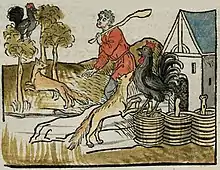chanticleer
English
Etymology

an illustration from the tale of Chanticleer and the Fox
Middle English Chauntecleer, from Old French Chantecler (modern Chanteclair), the proper name of the cock in the literary cycle of Reynard the Fox, that also gave origin to chantecler, the name of a chicken breed; from chanter (“to sing, to crow”) + cler (“clear, clearly”).
Attested in English since 1250–1300.
Pronunciation
Noun
chanticleer (plural chanticleers)
- (now rare, literary) A domestic rooster or cock, especially in fables and fairy tales.
- c. 1599, William Shakespeare, “Act 2”, in As You Like It, scene 7:
- When I did hear / The motley fool, thus moral on the time, / My lungs began to crow like chanticleer, / That fools should be so deep-contemplative […].
- 1603, John Florio, transl.; Michel de Montaigne, chapter 12, in The Essayes, […], book II, printed at London: By Val[entine] Simmes for Edward Blount […], OCLC 946730821:
- It is happily some particular sense that unto cockes or chanticleares discovereth the morning and midnight houre, and moveth them to crow […].
-
Verb
chanticleer (third-person singular simple present chanticleers, present participle chanticleering, simple past and past participle chanticleered)
- To make the crowing sound of a cock.
- To crow in exultation.
References
- “chanticleer” in Douglas Harper, Online Etymology Dictionary, 2001–2019.
- “chanticleer” (US) / “chanticleer” (UK) in Oxford Dictionaries, Oxford University Press.
- “chanticleer” in Merriam–Webster Online Dictionary.
- “chanticleer” in Dictionary.com Unabridged, Dictionary.com, LLC, 1995–present.
This article is issued from Wiktionary. The text is licensed under Creative Commons - Attribution - Sharealike. Additional terms may apply for the media files.